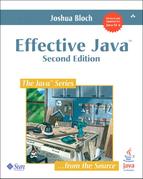First Edition Item Number | Second Edition Item Number, Title |
|---|---|
1 | |
2 | 3, Enforce the singleton property with a private constructor or an enum type |
3 | |
4 | |
5 | |
6 | |
7 | |
8 | |
9 | |
10 | |
11 | |
12 | |
13 | |
14 | |
15 | |
16 | |
17 | |
18 | |
19 | 14, In public classes, use accessor methods, not public fields |
20 | |
21 | |
22 | |
23 | |
24 | |
25 | |
26 | |
27 | |
28 | |
29 | |
30 | |
31 | |
32 | |
33 | |
34 | |
35 | |
36 | |
37 | |
38 | |
39 | |
40 | 58, Use checked exceptions for recoverable conditions and runtime exceptions for programming errors |
41 | |
42 | |
43 | |
44 | |
45 | |
46 | |
47 | |
48 | |
49 | |
50 | |
51 | |
52 | |
53 | |
54 | |
55 | |
56 | |
57 | |
78, Consider serialization proxies instead of serialized instances |
..................Content has been hidden....................
You can't read the all page of ebook, please click here login for view all page.
